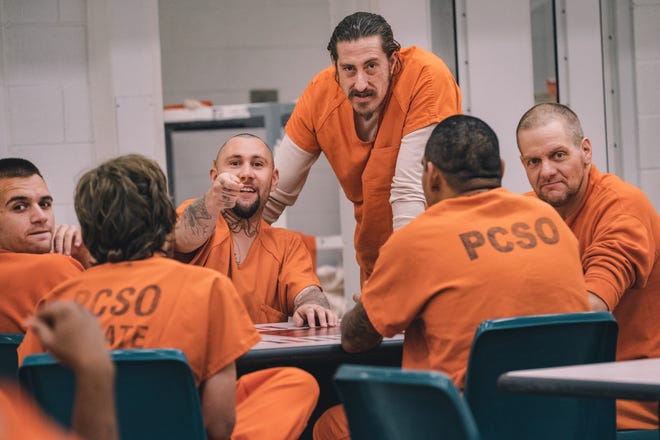I don't know about you, but every time I see a show about the harsh and violent world inside prison, I wonder: "How would I do in jail?" I've never been behind bars, have little-to-no "street smarts," and the last time I was in a fight was 6th grade. Would I be an instant target? Would I become someone's "bitch"?
So when I saw "60 days in Pinal County Jail" pop up as suggested viewing on Netflix, I thought this might be my chance to get a realistic picture of life in jail (or, at least, this particular jail).
 |
| Pinal County jail inmates |
In this show, seven "regular" people are sent undercover as inmates into this Arizona jail. Only the sheriff and a handful of other top officials are aware of their true identities. Each participant is given a "mission" to see what he or she can learn on one of three topics: Drug use, gangs, or "jailhouse operations."
The idea, according to Sheriff Mark Lamb, is to help him learn what is really going on in the jail. But let's face it: What we really want to see is whether the incoming "sheep" will by eaten alive by the prison's wolves.
I was particularly drawn to a slightly pudgy participant named Mark. The sheriff called him "soft" at the start and Mark admitted to being scared. Hey, I thought, that's me!
"60 Days in Pinal County Jail" goes to some lengths to portray the jail as dangerous. At every opportunity, the show flashes a montage of violent shots (inmates fighting, someone screaming, guards forcibly holding down a prisoner). To emphasize the point, the sheriff and his aides repeatedly state that the subjects are risking their lives.
But once you get past all the bluster, and watch as the cast members enter the jail and settle into daily life, well, not that much happens. While the series stretches to 11 episodes, there's probably only enough good material for seven or eight.
To gin up some tension, the show has to make the most of some pretty tepid disputes — a stolen can of soda, a TV that's too loud, or Mark's missed chance to sign up for a razor for shaving.
One thing this show has is swagger, and no shortage of it. The inmates, both men and women, have no problem talking tough. If you played a drinking game where you took a shot every time one of the inmates promised to hurt someone, you'd be shitfaced in no time.
But if you could only drink when an actual punch was thrown, well, you could easily get in your car and drive through a DUI checkpoint after most of the shows.
There are a few fights, but only between people who choose to fight (the male prisoners have a particular room designated for fighting). The scariest guy on the show actually turns out to be one of the participants, an ex-convict turned chaplain named Abner.
Abner seems to take his play-acting a little too seriously, quickly rising to the number two in the Chicano group in his jail pod, a spot he repeatedly tells us is "The Enforcer." Somewhere along the line he forgets that he supposed to be watching for trouble and not causing it.
"I lost myself in there," he admits later, adding, "I actually was a gang member in there."
Abner repeatedly stirs up the racial tension in the pod. In one of the most bizarre turns, Abner singles out a a young inmate who is trying to avoid the racial politics, punches him, and then goads another prisoner into landing a few more blows on the youth (who does not fight back).
Abner isn't the only one of the "cast" (that's what the show calls them) who behaves strangely One of them, a private investigator named Steve who brags ahead of time about how tough he is, causes problems almost the minute he enters the pod. He inexplicably gives the "emergency" extraction single in a non-emergency situation ("I just wanted to see if it would work," he says in the epilog). He then threatens to expose the whole program to the inmates. He is quickly yanked and sent home.
The three women, Brooke, Vivian and Jasmyn, are explicitly told ahead of time to work independently and not to congregate together. As soon as they enter the jail, they congregate together.
I liked another participant, a cop named David, who was tough, smart and often the voice of reason in defusing tensions between inmates. But he made two reckless mistakes late in show, revealing a connection to Abner and then confessing his undercover role to one of the guards. This triggers a cascade of events that causes the entire program to be cut short.
As it turns out, the participant who did the best was "soft" Mark. He stays close enough to the action to have a good view, without finding himself in too deep. Other than Steve (who barely had time to ruffle his sheets before being pulled), Mark is the only participant who didn't drawn suspicion as a snitch.

